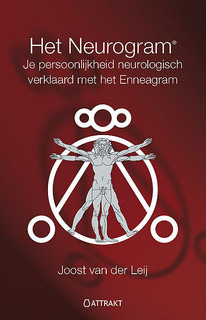The Neurogram Audiobook
The Neurogram® is a model for personality typing based on the Enneagram and the Big Five. The Enneagram is a centuries old system used by Sufis and Jesuits alike for better understanding people. The Big Five is the most common way within scientific psychology to look at personality. The problem with the Enneagram is that a number of so called experts have made a mess of it. The problem with the Big Five is that it is a static model of personality while we all know that our personality changes over time and is depending on our mood.
Licensed NLP Master Trainer® Joost van der Leij has developed the Neurogram® model in order to make the Enneagram compatible with Neuro-Linguistic Programming (NLP). Most NLP practitioners frown upon personality typing for they think, unfairly so, that personality typing limits someone's freedom. The truth is that taking into account your personality, actually widens the range of possibilities.
There are three very good reasons for learning the Neurogram® model (especially when you happen to be certified in NLP):
1) Neuroscientific research has shown that your personality follows specific hardware structures of your brain. Nowadays Big Five scores are related to MRI brainscans. So where NLP is about the software of your brain (what you learned during your life) the Neurogram® is about the hardware of your brain (what you were born with).
2) When working with other people, it helps immensely to take into account their different perspectives on the world. There is no faster and more effective way of finding out about other people's perspective than through the Neurogram® model.
3) NLP is brilliant with short-term strategies, but has a real problem with long-term strategies because they fail consistently for months, are awkward and a struggle before they pay off. The NLP practitioner lives by the credo to stop doing what isn't working and do more of what does work. It is a very good credo for most things in life, but doesn’t do well when it comes to personality issues where long-term solutions work much better.
Of course all of this won't persuade the diehard NLP practitioner who won’t abandon his idea that you can do whatever you want with NLP and doesn’t accept the obvious limitations that reality faces all of us with. For instance, I dare such an inflexible NLP practitioner to fly to the planet Mars and get me a real rock from Mars. No matter how much he wants to do this, it won' t happen. And I haven't even been talking about visiting other planets. Reality limits what we can achieve and taking these natural limitations into account when we decide what we want to do with our lives is very healthy. No jumping off buildings because you think NLP teaches you how to fly. It's okay to do that in your imagination. It is quite another thing if you try that for real. What learning the Neurogram® model means for you is that you get a better grip on and understanding of some of the natural patterns that the hardware of your brain provides.
The Neurogram® audiobook is a two hour live recording of a Neurogram® workshop at Starwood Festival, one of the oldest hippy festivals still going strong with more than 1500 people attending. Part one is about how to discover which Neurogram® type fits you best. Unlike other systems of personality typing this isn't based on recognizing your own type, but eliminating the other eight types. Thus preventing well-known problems with personality description that are so hypnotic that everyone will recognize themselves in one and the same description. In part one you learn:
- Which Neurogram® type fits you best by eliminating the eight other types.
- Dynamic personality development #1: how to reduce stress and get more relaxation.
- Dynamic personality development #2: how to stop sinning and live more virtuously.
In part two we show how to look for signs in other people's behavior that give away their Neurogram® type and how to covertly ask test questions to double check your initial intuitions. From that you learn:
- How to recognize other people's Neurogram® type.
- What their perspective is on life and what motivates them.
- How to influence them easily and effectively.
(As a bonus you also get a third recording (75 min) of a Neurogram workshop.)
